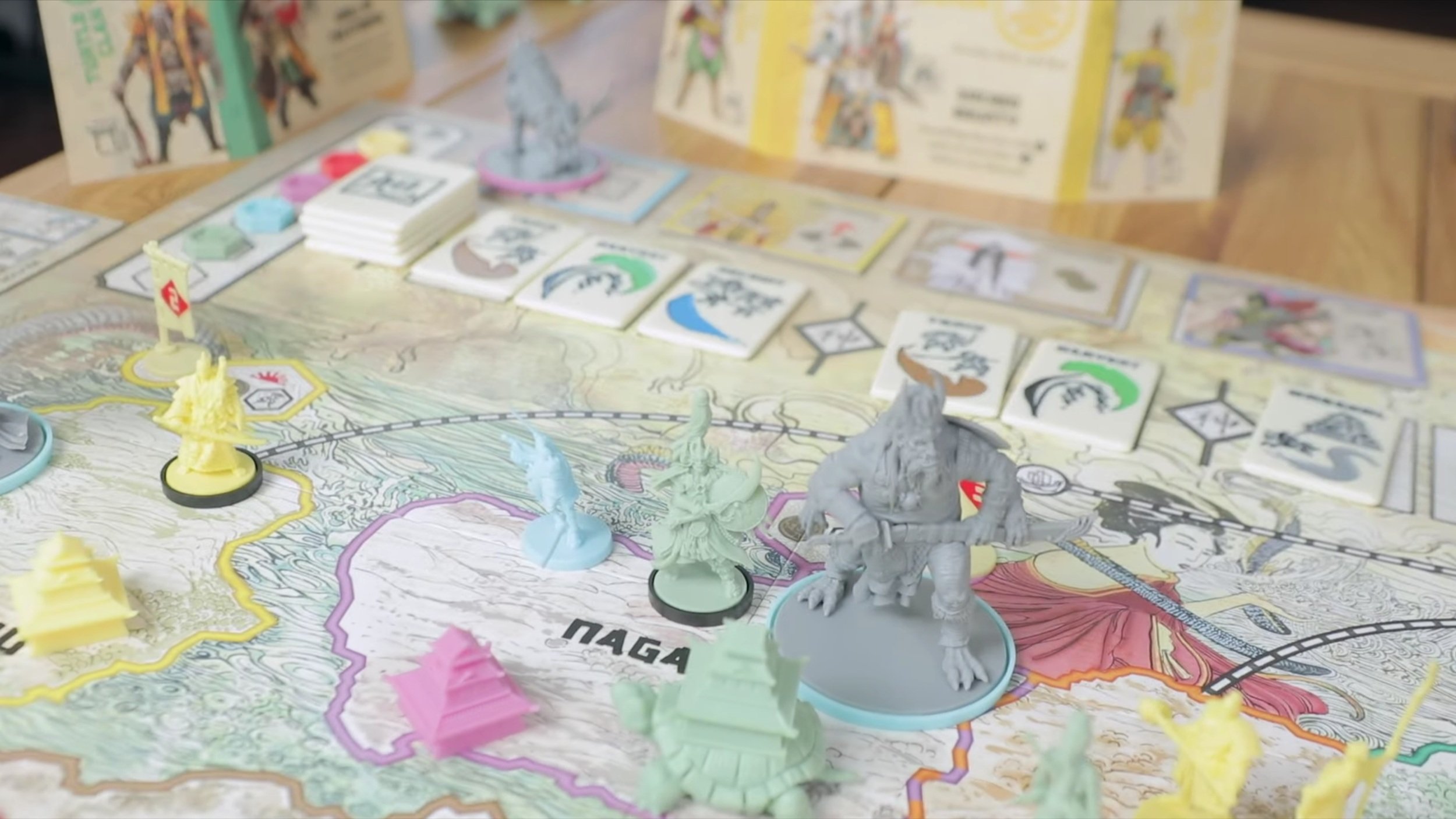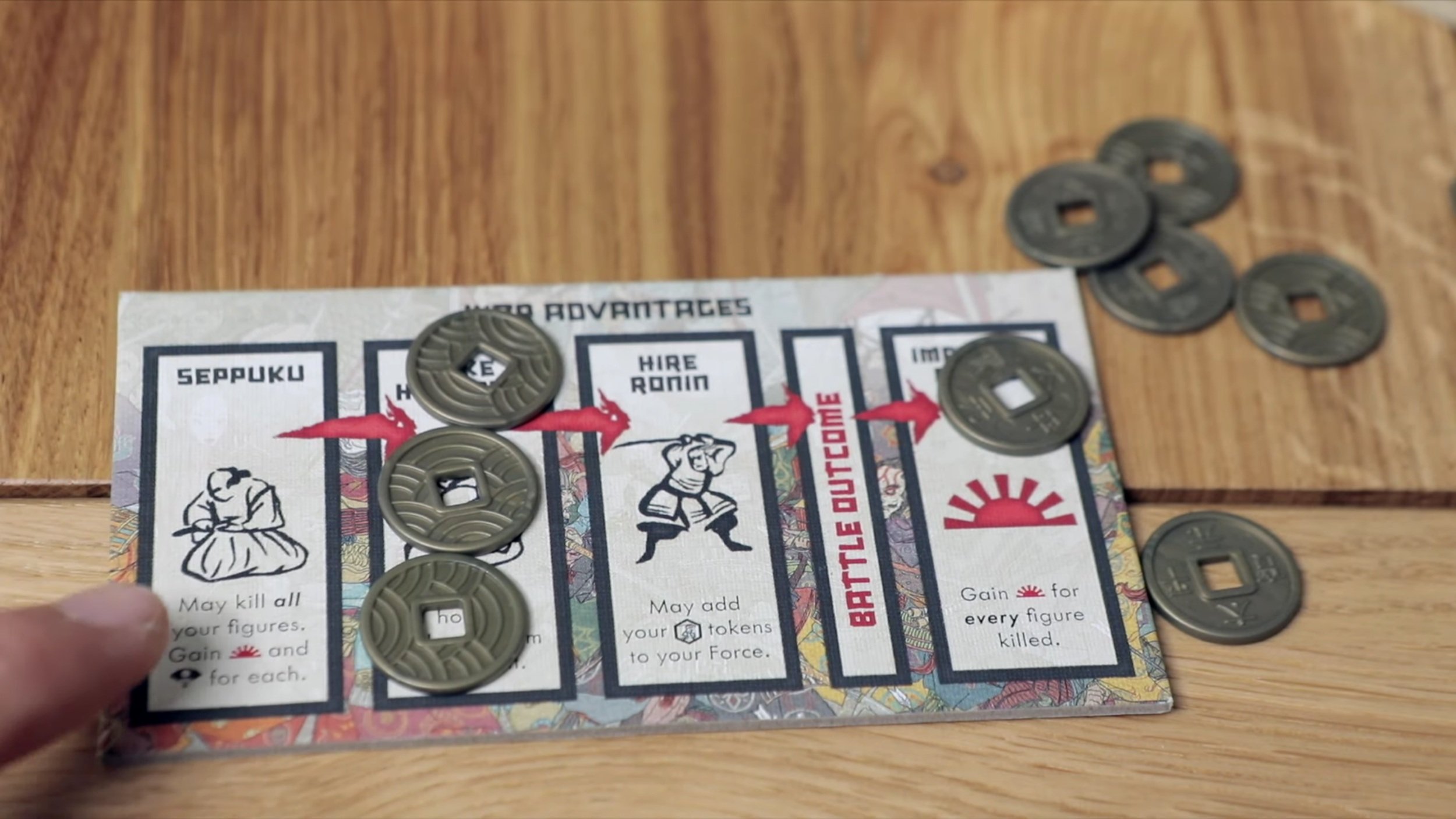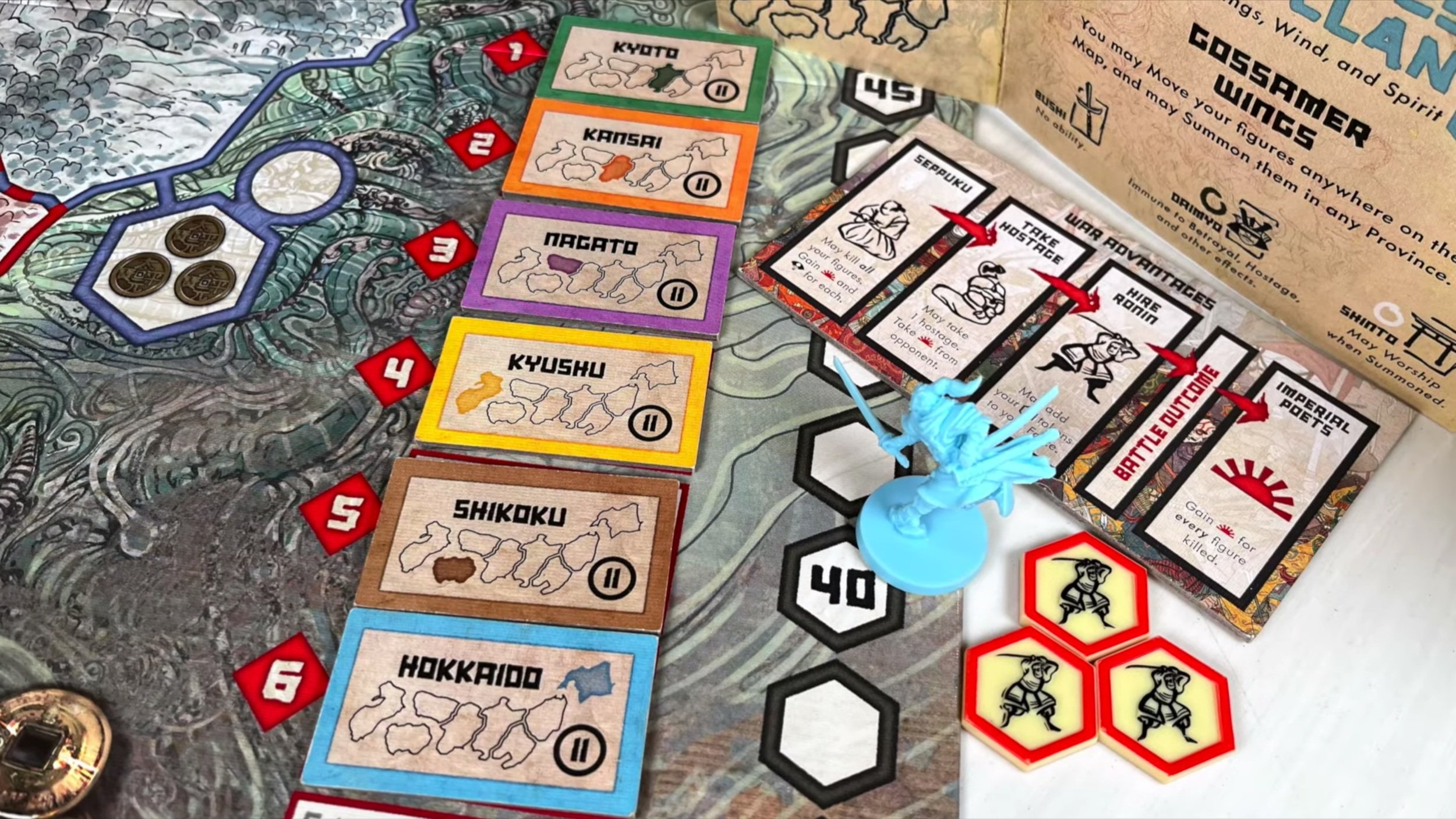Rising Sun Review
Eric M. Lang area control with bidding combat, asymmetric factions, and highly nuanced victory point sources!
The 2nd in the trilogy of Eric M. Lang’s area controls including Blood Rage and Ankh, Rising Sun is a 3-5 player game set in legendary feudal Japan that takes about 2 hours. Expect tons of diplomacy, tactical losses, and an incredibly deep turn system where benefits are shared, and must be masterfully manipulated to come out ahead!
Video published November 21th, 2022

Utilize action tiles to carefully position minis and gather resources!

Use coins to blind bid in combat under 4 different bonuses!

Fight over multiple regions every round, collect different colors for massive point bonuses!
Playcount:
We’ve played the base game over a dozen times over the course of 4 years! As such, our review takes into account our own evolving meta, combined with research through various bgg strategy threads!
For a more detailed how to play and elaboration on our points, check out our video review!
Component Pros:
Components clearly color coded for gameplay clarity
Includes all faction parts like minis, tokens, locations, etc.
Seasonal card backs coded per season, card fronts color coded for ability type
Action tiles each have different colors
Wide variety of component shapes and sizes, when combined with distinct colors, result in everything being easily parsed at a glance
Excellent quality and variety of minis (58 minis total)
Factions have unique minis from one another, alongside variety of mini types based on unit type
Factions have mini ring bases for further gameplay clarity when identifying unit types and ownership
Amazing player aids that detail faction setup, unique abilities (shows to whole table not just its player), that doubles as a bidding screen
Individual player aids double as bidding slots, coins placed on its icons
Gameplay Round player aid at top of map, action tiles are placed onto it
Point/honor markers have nubs on their edges, can slot into each other to not shift when stacked
Plastic coins great way to get clink noise without having to be costly like metal
Gameplay Pros:
Honor track determines who wins ties, extremely important (ties happen a lot) pecking order established at all times that constantly shifts
Kami are an excellent mechanic to entice players to not just mass dump units on the board, can get massive resource benefits from having the most units diverted off map
Highly engaging opportunity costs to weigh when contesting other players for Kami or for map control
5 possible actions in the game, most cause the whole table to also do the action, MUST plan ahead to see who gets the most benefit from your choices if you want to succeed
10 total action tiles, player turn is draw 4 choose 1, only 7 turns a round, very important to be counting which actions are left before stack resets next round
You and ally both get bonuses from your actions, must be careful to not benefit ally too hard when game end there’s still only 1 winner from most points
Alliances form and break throughout the game, extremely opportunistic and highly diplomatic gameplay to see who can squeeze the most value from each other
Different resources spread out on the map, cannot stay put and highly rewards moving around and engaging with other players even before war phase
4 different bidding categories in combat leads to absurd levels of nuance in bluffing and commitment
While winning numerous fights scores massive points, the cost of doing so can be great, must weigh against benefits of strategically losing
Losing can improve honor and still score points via seppuku, and if properly bluffed, can be done incredibly cheaply, possible to come out ahead in resources/points when losing fights if victor spent too much
Rippling effects across whole table as losers gains all the victor’s coin spent, may end up influencing future fights during the round
Seasonal cards introduce build-a-bear asymmetry as game goes on
Certain builds allows for crazy playstyles to enhance current point sources, or introduce entirely new point avenues
Ultimately, crazy amount of depth and interaction that stems from recognizing game states and shifting the table in your favor to deny opponents while propping yourself up, tons of tools to consider with actions/cards, tons of choosing the right battles to commit to
Component Cons:
Rulebook has bad flow of information when read front to back
Specifically, too much gameplay terminology and jargon used early on, won’t mean anything until halfway through when the actions are explained
Additionally, some areas have vague wording that need further clarification. Hostage mechanic doesn’t say where hostages get returned to during upkeep. Many seasonal cards don’t specify exact timings of abilities, causes confusion on when they’re allowed to be used and what exactly they apply to (do trading, bidding, and buying all count as “spending money”?)
Massive art that takes up more than half of whole pages, makes rulebook much more page-turny than it has to be, very annoying to go back looking for a ruling
Coins need more denominations besides just ones
Seasonal ability sets need more distinct card backs beyond just colors, needs much clearer set icons for easier setup, mix/matching clarity, and gameplay clarity
Flat stronghold tokens can get hard to see later on in a sea of minis, should’ve been a standee or cardboard 3D terrain
Not enough plastic bags pieces have to go back inside boxes for minis for the sake of space
Gameplay Cons:
Factions imbalanced
Bonsai and Dragonfly on weaker side, Dragonfly not as bad
Dragonfly’s ability to teleport anywhere on the map less good than you’d think because the map is tiny, can basically go anywhere in 2-3 moves, not much better than 1 move
Especially the case in high player counts, whole map is flooded, can’t really be opportunistic with fights if every area is hard to win
Having dudes in the “right” place much less important than outright winning a variety of different fights for massive points, which more money or combat abilities is more suited for
Thus, teleporting is somewhat misleading strength, it’s best used to form massive deathballs that can go anywhere at a moment’s notice, which while viable, is more easily countered (either don’t engage or setup a great loss against the deathball) than just straight up being good at fighting (having to do the whole 4 category bidding combat mindgames against someone with more resources is tough if you’re both trying to win if you don’t have combat bonuses)
Teleporting also good with season ability cards that trigger effects in areas moved to, again though, easier to deny from either buying them first or just never picking the buy action at convenient times for Dragonfly)
Bonsai’s discount ability extremely contingent on what actions others play, hard to squeeze a ton of value from ability when you have less money to start with in the first place
Buying a moderate amount of stuff puts you at parity with other factions since they start with more money, you have to be buying a high amount of stuff to actually pull ahead
Not having coin upfront hurts a lot for political dealmaking, can’t make good trades since discount is only for buying stuff, so while small amounts are huge for you, they’re still small amounts for everyone else
Discounts just for buying, not for bidding, which still needs high amounts of coin to win fights
Starts with lowest honor, goes last and loses all ties
Possibly balanced around kickstarter exclusive content, which adds more expensive things to buy, thus harder to block bonsai and they have higher power options to chase
Seems more tailored towards buying virtues to generate points from season card synergies rather than winning lots of fights
Certain set-in-stone aspects of the game arguably clash with just how much variance can sprout from gamestates, such as every clan having specific starting money, honor, and starting locations
Given how much impact good diplomacy makes, why the set openings? More interesting and varied deals would be made if starting facets like money/honor/location were randomized
Would add insane replayability, given how much of the game is self-balanced by the players anyways
Recommender Score
Rising Sun is a great game! While there are imbalances in a vacuum, the game’s systems are so deeply diplomatic anyways that the factions could still be even more imbalanced than they currently are and the game would still work just fine because of how much control the players all exert over each other, not just in what actions they pick but also in who they ally with. Thus, while the balance is primarily what’s dragging the score down, it’s not a game-breaker by any means. Of course, the slighter cons like the rulebook and clarity of certain components are slight contributors as well.
So if you’re interested in an area control game with a ton of minis that’s deeply diplomatic, has a unique action system that affects all players on your turn, as well as super in-depth bidding combat, definitely check out Rising Sun! If any of that doesn’t sound up your ally, tread with caution, because Rising Sun’s gameplay is nowhere near more standard area controls that involve moving tons of forces into other players and rolling tons of dice, in fact, having a ton of units isn’t even that strong! You HAVE to pay way more attention to a player’s resources and abilities, which can easily let them amount massive amounts of combat power from the 4 category bidding system, which does have a tendency to massively shift the final combat efficacy of those who are battling. The cards, coins, and tiles are really what fuels the action in this game, and less the minis themselves despite their abilities, which must be used with precision rather than for the sake of board presence.



















